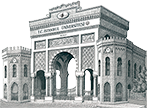The Book of Islamic Sciences in the First Hijrī Century, the First of the Studies Within the Scope of the Project of Islamic Sciences Throughout History Was Published
Islamic Sciences in the First Hijrī Century, ed.: Hidayet Aydar, Ziyad Alrawashdeh, Elif Gül Gökhan, Sultan Ümmügülsüm Gündüzalp, Ülfer Karabulut, Ümit Eskin, Yasemin Çelikhası, Khadeejeh Alrawashdeh, I-II, İstanbul: Ensar Neşriyat, 2020.
The book of Islamic Sciences in the First Hijrī Century, the first of the studies within the scope of the project of Islamic Sciences Throughout History, which was carried out with the aim of analyzing the tradition of Islamic science in depth and creating historical integrity that would allow comparing the scientific knowledge that emerged in the same period, was published. This work, which deals with the scientific activities and developments in the first century, which is like a source for Islamic sciences and has great importance in grounding many issues, consists of two volumes. The first volume devoted to Quranic Sciences and Tafsir contains a total of twenty-one articles, ten of which are in Arabic. Based on its key importance in the first century of Tafsir (Exegesis), Qirāāt (Readings) and History of Mushaf, the studies focused on the works of the ṣaḥāba (Companions) and the generation of tābi'ūn (successors), with the prominent centers of science and pioneering missions in the science of Tafsir.
There are articles in the fields of Hadith, Islamic Law, Kalam, History of Sects, Arabic Language and Sīrah In the second volume, which consists of twenty-six works in Arabic and Turkish. In the studies in the fields of Hadith and Islamic Law, subjects such as the writing of hadiths, the persons who had influence on the formation of fiqhī sects and the first methodical disputes were analyzed. The First Century of Hijrī has a special importance in terms of the studies of Kalam and History of Sects due to disputes between Muslims and the emergence of core ideas that affected the formation of iʿtiqādī sects. For this reason, in the studies in the aforementioned fields in the work, the effects of political and social events on sectarianization and the formation of the science of Kalam and the subjects related to the individuals associated with the religious sects have gained intensity. While analyzing the first language studies and the effects of the Pre-Islamic poetry in the field of Arabic Language studies, the prominent people with their aspect of being historiographer in the field of Islamic History and Sīrah were discussed. In this context, emphasis has been placed on the names described as the leading names of Sīrah, their historical methods and their contribution to the next process.


